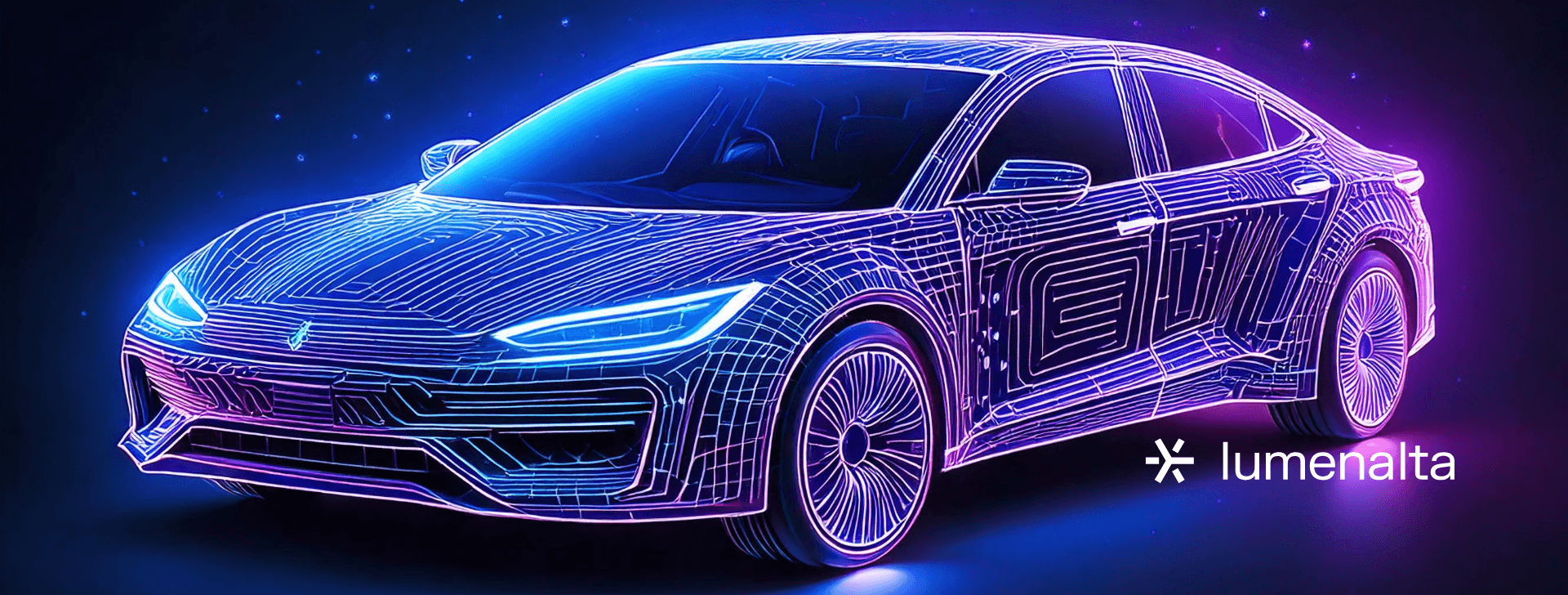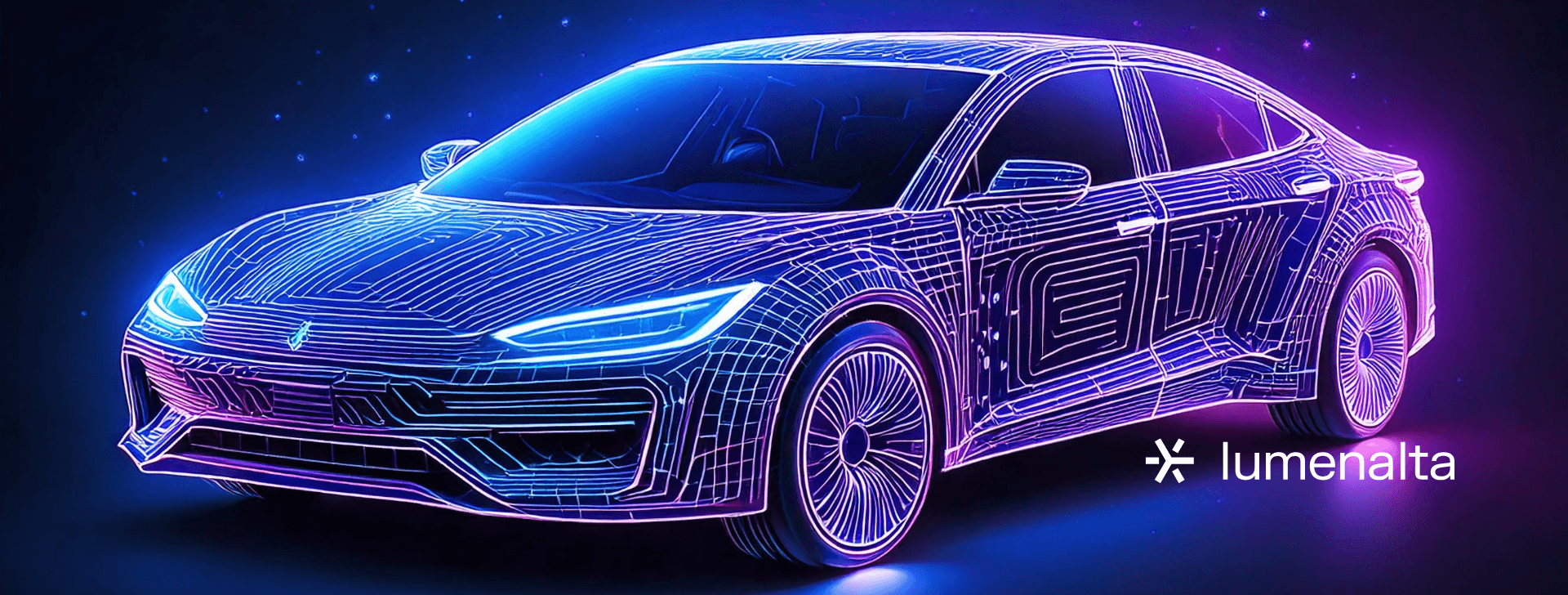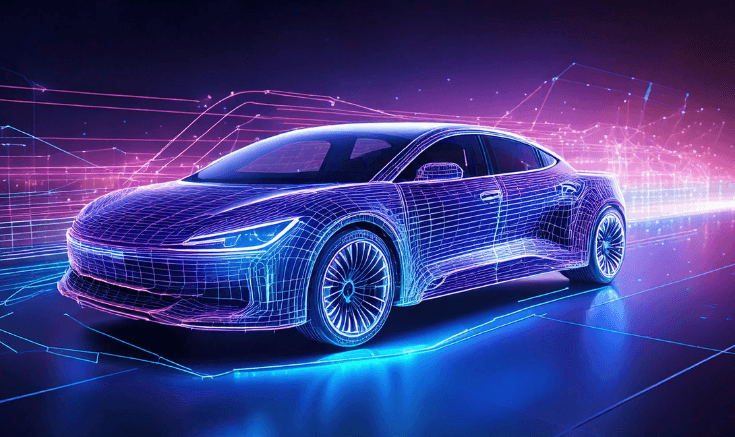

Digital transformation in the automotive industry
JAN. 21, 2025
8 Min Read
Digital transformation is shifting the automotive industry, redefining how vehicles are designed, manufactured, and experienced.
Advanced technologies such as artificial intelligence (AI), Internet of Things (IoT), and predictive analytics drive innovation across production, customer engagement, and sustainability efforts. As automakers adapt to these shifts, they unlock measurable business benefits, ranging from cost efficiency to enhanced scalability. This evolution highlights the importance of embracing digital strategies to meet modern demands and create future-ready solutions.
Key takeaways
- 1. Digital transformation leverages advanced technologies like AI, IoT, and predictive analytics to optimize production and enhance customer experiences.
- 2. Connected vehicles improve safety, convenience, and engagement through real-time features and personalized services.
- 3. Predictive analytics enhances operational efficiency by identifying disruptions, minimizing downtime, and improving scalability.
- 4. Electric vehicle development benefits from digital tools such as virtual simulations and digital twins, reducing costs and accelerating delivery timelines.
- 5. Robust cybersecurity and governance frameworks support seamless integration and build trust among customers and stakeholders.
What is digital transformation in the automotive industry?

Digital transformation in the automotive industry involves applying advanced technologies like artificial intelligence, machine learning, cloud computing, and the Internet of Things to modernize operations, enhance customer experiences, and improve overall efficiency. This transformation optimizes every stage of the automotive value chain, from manufacturing processes and supply chains to post-sale services and connected vehicles.
Adopting these technologies allows automotive businesses to build more intelligent systems, such as predictive maintenance powered by real-time data or AI-enabled infotainment solutions. Partnerships like the Cerence and NVIDIA collaboration highlight how AI tools support intuitive and connected experiences, showcasing how technology enables smarter, user-focused automotive innovations.
In addition to streamlining operations, this approach supports sustainability goals by reducing waste and accelerating the shift to electric vehicles. Integrating digital technologies unlocks untapped potential, enabling scalable solutions that deliver measurable value to manufacturers, investors, and consumers.
“Digital transformation in the automotive industry involves applying advanced technologies like artificial intelligence, machine learning, cloud computing, and the Internet of Things to modernize operations, enhance customer experiences, and improve overall efficiency.”
The impact of digital transformation on the automotive industry
Digital transformation has reshaped the automotive industry by introducing smarter, more efficient, cost-effective processes that enhance production and customer engagement. These advancements enable manufacturers to produce safer, more sustainable vehicles connected to modern consumers' needs.
Technologies like AI and IoT have transformed automotive manufacturing into a data-centric operation. Predictive analytics now identify potential supply chain or machinery issues, reducing downtime and operational costs. Real-time insights from connected vehicles help manufacturers fine-tune designs and create innovative features tailored to customer preferences. These enhancements not only improve time-to-market but also optimize scalability and maximize profitability.
The shift toward electric and autonomous vehicles represents another transformative outcome. Automakers can now integrate data-led strategies to accelerate product development and adapt to regulatory requirements more easily. This approach addresses immediate industry challenges and establishes future-proof systems that align with evolving mobility demands.
Benefits and challenges of automotive digital transformation

The journey toward digital transformation in the automotive industry offers many benefits but also presents significant challenges. While technology adoption unlocks opportunities for scalability and improved efficiency, organizations must address operational and strategic hurdles to achieve measurable outcomes.
Benefits of automotive digital transformation
- Enhanced efficiency through automation: Digital transformation replaces manual processes with automated workflows, reducing errors and boosting production speed. Robotic process automation (RPA) and smart manufacturing systems streamline assembly lines and supply chain management.
- Cost savings with predictive technologies: Real-time monitoring and predictive maintenance lower repair and replacement costs. IoT-enabled devices identify potential issues early, minimizing disruptions and ensuring continuous operations.
- Customer-centric innovation: Connected vehicles powered by AI and IoT improve customer satisfaction through features like voice-activated controls and real-time service updates. These innovations drive revenue by meeting evolving consumer expectations.
- Sustainability and resource optimization: Digital tools help manufacturers reduce waste and energy use. For instance, smart energy systems and data analytics optimize resource allocation, supporting sustainability goals while cutting costs.
- Faster time-to-market: Advanced modeling tools, digital twins, and agile development frameworks speed up the product development cycle. Companies can test and refine designs virtually, reducing delays and increasing adaptability.
Challenges of automotive digital transformation
- High implementation costs: Upfront investment in technology infrastructure, software solutions, and skilled talent can strain budgets. Companies need scalable strategies to manage these costs while delivering returns.
- Data privacy and security risks: Connected vehicles and smart manufacturing generate vast amounts of data, raising cybersecurity concerns. Automotive companies must adopt robust governance to protect sensitive information and prevent breaches.
- Integration complexities: Combining legacy systems with modern technologies requires seamless coordination. Mismatched systems can lead to inefficiencies and reduced scalability.
- Talent gaps: The industry faces a shortage of skilled workers to manage and operate digital technologies. Reskilling current staff or hiring new talent is essential to ensure long-term success.
Despite these challenges, automotive digital transformation holds significant promise. Companies that address these obstacles strategically can achieve measurable improvements in efficiency, customer engagement, and sustainability, ensuring competitiveness in a progressively advancing industry.
6 examples of digital transformation in the automotive industry

Digital transformation has brought significant advancements to the automotive industry, introducing smarter technologies that improve production efficiency, customer experiences, and overall scalability. Organizations are leveraging these innovations to unlock untapped potential and address critical challenges in the sector.
- Smart factories optimize production: IoT devices and robotics have become integral to automotive manufacturing. These technologies streamline operations, reduce errors, and lower production costs by automating routine tasks. Real-time data analytics enhances evaluation, enabling manufacturers to scale operations efficiently and meet market demands faster.
- Connected vehicles transform mobility: Advanced connectivity solutions powered by IoT and AI provide features like real-time navigation, predictive maintenance, and voice-controlled interfaces. These enhancements improve safety, reduce downtime, and align vehicles with customer expectations for smarter, more convenient driving experiences.
- Electric vehicle innovations improve efficiency: Digital twin technology allows manufacturers to prototype and test EV designs virtually. This reduces development timelines, optimizes battery performance, and cuts costs associated with physical testing. The ability to deliver EVs faster while meeting sustainability goals creates measurable value for stakeholders.
- AI-powered supply chain management reduces delays: Predictive analytics identifies disruptions in supply chains and provides actionable insights for manufacturers. This technology improves inventory management, shortens production cycles, and contributes to cost-effective and scalable operations.
- Autonomous vehicles advance future mobility goals: AI and machine learning enable autonomous vehicles to process data from advanced sensors, ensuring precise navigation and enhanced safety. These innovations offer manufacturers new opportunities for growth while catering to consumer demand for cutting-edge mobility solutions.
- Immersive customer experiences redefine engagement: Virtual reality (VR) and augmented reality (AR) have reimagined how customers interact with automotive brands. These tools allow users to customize vehicles, experience virtual test drives, and explore options from their homes, creating a seamless and engaging purchasing process.
The ongoing adoption of digital transformation technologies offers manufacturers and investors significant opportunities to drive business growth. These advancements accelerate time to market, reduce operational costs, and enhance customer loyalty, providing scalable solutions that align with modern demands and maximize long-term returns.
Implementing strategies for automotive digital transformation

Implementing digital transformation strategies in the automotive industry demands a targeted approach integrating technology, processes, and workforce alignment to deliver measurable results. Companies must focus on building a scalable foundation, optimizing operations with data, fostering organizational alignment, and prioritizing cybersecurity to achieve sustainable growth and long-term success.
Building scalable technology foundations
Modernizing legacy systems with cloud platforms, APIs, and microservices is critical to seamless operations. These systems support real-time data integration across manufacturing, supply chains, and customer engagement platforms, reducing inefficiencies and accelerating delivery timelines.
Optimizing operations through data-backed insights
Data analytics transforms how automotive companies manage operations. Predictive maintenance uses IoT sensors to monitor equipment performance, minimizing downtime and reducing repair costs. Analytics also help manufacturers refine workflows and align production with market demands, uncovering new business opportunities.
Fostering organizational alignment and agility
Workforce alignment is essential for the adoption of new technologies. Training programs equip employees with the skills needed to operate advanced tools, while agile processes encourage collaboration and efficiency. Stakeholder alignment minimizes resistance and accelerates implementation, delivering measurable outcomes.
Strengthening cybersecurity and governance
The increasing reliance on connected systems requires robust cybersecurity measures to protect data and operations. Governance frameworks provide clear accountability and streamline system integration, supporting operational efficiency and scalability.
Automotive companies that implement these strategies effectively can reduce costs, accelerate time to market, and achieve scalable growth. Leveraging innovative technologies and fostering alignment allows businesses to maximize returns, unlock new potential, and create future-proof systems tailored to market demands.
"Companies must focus on building a scalable foundation, optimizing operations with data, fostering organizational alignment, and prioritizing cybersecurity to achieve sustainable growth and long-term success."
Key trends with digital transformation in the automotive industry

Digital transformation is shaping the future of the automotive industry, introducing trends that redefine production, customer experience, and mobility. These trends highlight how advanced technologies are unlocking new opportunities for growth, scalability, and sustainability.
- Electrification accelerates growth opportunities: The shift toward electric vehicles (EVs) has become a key focus for manufacturers. Companies are leveraging digital tools to optimize EV design, battery performance, and production processes, reducing costs and improving speed to market.
- Connected vehicles enhance customer experiences: IoT-enabled vehicles offer real-time navigation, remote diagnostics, and personalized infotainment systems. These features improve convenience and generate valuable insights that allow manufacturers to develop tailored services.
- Artificial intelligence powers autonomous driving innovations: AI and machine learning technologies are advancing autonomous vehicle capabilities, improving safety through real-time data analysis and precise navigation. These advancements are paving the way for widespread adoption of self-driving cars.
- Predictive analytics improves manufacturing efficiency: Data-backed insights from IoT devices are helping manufacturers optimize workflows and predict potential disruptions in supply chains. These capabilities minimize downtime, improve scalability, and deliver measurable cost savings.
- Sustainability remains a core priority: Integrating digital tools supports sustainable manufacturing by optimizing energy use, reducing waste, and advancing green mobility initiatives. These efforts align with regulatory requirements and growing consumer demand for environmentally friendly solutions.
- Immersive technologies transform car-buying experiences: Augmented reality and virtual reality solutions enable customers to explore vehicle features, customize options, and experience test drives from anywhere. This trend enhances customer engagement while streamlining the purchasing process.
These trends emphasize the potential of digital transformation to reshape the automotive industry, creating scalable and innovative solutions that deliver measurable business impact. Companies that embrace these advancements are positioned to unlock untapped opportunities, improve efficiency, and lead the future of mobility.
Digital transformation is not just about adopting technology—it’s a pathway to more brilliant, faster, and more innovative automotive operations. From scaling production to enhancing customer experiences, these strategies unlock measurable results that position businesses to lead. At Lumenalta, we specialize in building tailored digital solutions that align with your business goals. Let’s light the way to success together.
table-of-contents
- What is digital transformation in the automotive industry?
- The impact of digital transformation on the automotive industry
- Benefits and challenges of automotive digital transformation
- 6 examples of digital transformation in the automotive industry
- Implementing strategies for automotive digital transformation
- Key trends with digital transformation in the automotive industry
- Common questions about digital transformation in the automotive industry
Common questions about digital transformation in the automotive industry
What is digital transformation in the automotive industry?
Why is digital transformation necessary for automakers?
How do connected vehicles benefit the automotive industry?
What role does data analytics play in automotive digital transformation?
What challenges do automakers face in digital transformation?
Want to learn how digital transformation can bring more transparency and trust to your operations?






